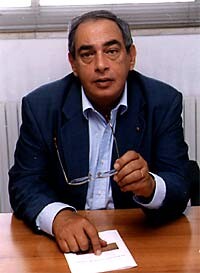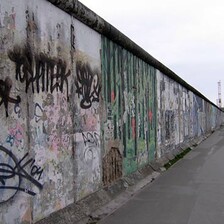The Electronic Intifada 23 September 2004

Afif Safieh
Safieh, who is in touch with Arafat on a daily basis, is of the opinion that the British Prime Minister does not represent the depth of feeling in British society on the question of Palestine. “I have often told several members of Tony Blair’s entourage, that he often in his statements in Parliament or in press conferences shows excessive understanding for Sharon’s policies, in a way that even Ha’aretz (a liberal Zionist newspaper) might find so uncritical as to be unpublishable” lamented Safieh. “I say it out of friendship to Tony Blair who I met years before he became leader of the Labour party.”
When the issue of the wall - which Safieh refers to as the “wall of shame” - was addressed in Parliament at the demand of a Jewish M.P., Sir Gerald Kauffman, it was unanimously condemned because “no-one was available to stand up and defend the official Israeli position” Safieh noted. He hopes that, “Tony Blair will take these indicators as a message of what is expected from him, not by us Palestinians, but by British public opinion.”
In the following weeks, Safieh will be addressing the fringe meetings of various Middle East councils representing the mainstream British political parties. Although, all political parties in this country support the two-state solution - the most plausible scenario from a Palestinian view-point according to Safieh - would be a Labour victory with a reduced majority. Safieh explained that, “we have in Parliament a core group of over two hundred MPs who are extremely supportive of Palestinian aspirations and I believe that a Labour party with a reduced majority will have to take into account that block of support.”
Somewhat unsurprisingly, Safieh is dismissive of the current Likud-led government in Israel although he is not fond of Labour either. “I always say that it was Israeli-Labour that made Palestine unliveable for Palestinians. What Likud does is to make Israel also unliveable for many Jews. Likud-led governments always constitute an embarrassment to their supporters abroad.” Safieh pointed out that, “in Parliament today each time the issue of Palestine/Israel is addressed there is a proportion of 4-1 in our favour.”
On political prospects in Israel/Palestine, Safieh is pessimistic. “Unfortunately one should only see in the foreseeable future Sharon, being succeeded by Sharon, being succeeded by Netanyahu.” Safieh surmises that Labour is in decline. “They (Labour) are out of steam, out of breath, out of new ideas. They haven’t succeeded in attracting the oriental Jews; they haven’t succeeded in captivating a significant number of Russian Jews and Russian non-Jews. Labour no longer constitutes an alternative to Likud and Likud ideology. At best Labour can aspire to be the junior partner of the Likud coalition offering more domestic acceptability and international respectability.”
Safieh is scathing when it comes to Sharon’s strategy of “unilaterally disengaging” from the Gaza strip. “Sharon with his idea - which he has not even succeeded in selling to his own coalition - of unilateral disengagement from Gaza is not intended as a “gift” to the Palestinians. Sharon himself said it to Yedioth Ahronoth (Israel’s most popular daily newspaper) that his project should instead be seen as a “punishment and not a reward” to the Palestinians.”
However, Safieh is just as critical when it comes to the idea of the “one state solution” which is becoming increasingly popular among some Palestinian intellectuals, due to the construction of a wall in occupied Palestinian territory, which many argue will complicate the creation of a Palestinian state. Although Safieh admits that he was predisposed to the one state solution in the late 60s, today he is committed to the two state solution and his reasoning is simple. The political environment has changed.
“In the 60s we naively thought that we were on our way to victory - we the Palestinians who had become the Jews of the Jews did not want to make the Jews of Palestine the Palestinians of the Palestinians. Our offer was a unitary, democratic, secular, bi-cultural, multi-confessional, plural-ethnical Palestine. To achieve it we needed either a military victory against the Israeli state or seducing and persuading a majority within the Jewish community settled in Palestine. We achieved neither.”
“Today that idea of a one state solution, which is not a new strategic vision but a “reheated old dish” (and Safieh places emphasis on this) is emanating from circles that are depressed and are no more convinced of the feasibility of the birth and the creation of a Palestinian state on part of Palestine. So this idea is emanating in the framework and the mentality of defeat and the psychology of failure.” Safieh believes that, “Sharon and the Likud work for a one-state-solution, the Israeli state and a no-state-solution for the Palestinians who will instead be offered reservations and ghettos.”
He continued, “those who invoke demography and quantitative factors, I would like to remind them, unfortunately, that Apartheid in South Africa worked for several decades in spite of an overwhelming preponderance of the black African society of over 40 million and the minute white presence in South Africa of less than 5 million. So for those who are just waiting for the moment in the year 2020 when we will be 50% plus one of the population are in my opinion extremely naive.”
He concluded by saying, “there won’t be peace in Israel/Palestine unless there is a decisive, assertive role and input by third parties, by the international community. I always hope for a more decisive European role and have always told European officials that Europe is still an actor in search of a role. We in the Middle East have a role in search of an actor. If we could merge the two we would live less unhappily ever after.”
Victor Kattan is a correspondent for Arab Media Watch and a member of its advisory committee. He is an occasional contributor to EI and can be contacted via writekattan@yahoo.co.uk





